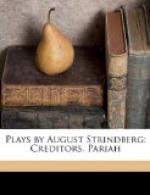Adolph. Oh, that’s true enough, like everything you say. Once I used to have men for friends, but I thought them superfluous after I married, and I felt quite satisfied with the one I had chosen. Later I was drawn into new circles and made a lot of acquaintances, but my wife was jealous of them—she wanted to keep me to herself: worse still—she wanted also to keep my friends to herself. And so I was left alone with my own jealousy.
Gustav. Yes, you have a strong tendency toward that kind of disease.
Adolph. I was afraid of losing her—and I tried to prevent it. There is nothing strange in that. But I was never afraid that she might be deceiving me—
Gustav. No, that’s what married men are never afraid of.
Adolph. Yes, isn’t it queer? What I really feared was that her friends would get such an influence over her that they would begin to exercise some kind of indirect power over me—and that is something I couldn’t bear.
Gustav. So your ideas don’t agree—yours and your wife’s?
Adolph. Seeing that you have heard so much already, I may as well tell you everything. My wife has an independent nature—what are you smiling at?
Gustav. Go on! She has an independent nature—
Adolph. Which cannot accept anything from me—
Gustav. But from everybody else.
Adolph. [After a pause] Yes.—And it looked as if she especially hated my ideas because they were mine, and not because there was anything wrong about them. For it used to happen quite often that she advanced ideas that had once been mine, and that she stood up for them as her own. Yes, it even happened that friends of mine gave her ideas which they had taken directly from me, and then they seemed all right. Everything was all right except what came from me.
Gustav. Which means that you are not entirely happy?
Adolph. Oh yes, I am happy. I have the one I wanted, and I have never wanted anybody else.
Gustav. And you have never wanted to be free?
Adolph. No, I can’t say that I have. Oh, well, sometimes I have imagined that it might seem like a rest to be free. But the moment she leaves me, I begin to long for her—long for her as for my own arms and legs. It is queer that sometimes I have a feeling that she is nothing in herself, but only a part of myself—an organ that can take away with it my will, my very desire to live. It seems almost as if I had deposited with her that centre of vitality of which the anatomical books tell us.
Gustav. Perhaps, when we get to the bottom of it, that is just what has happened.
Adolph. How could it be so? Is she not an independent being, with thoughts of her own? And when I met her I was nothing—a child of an artist whom she undertook to educate.




